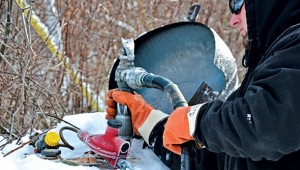Propane supply webinar: Communication key for industry, consumers
Industry officials are pushing for widespread distribution of a propane supply and winter preparedness webinar produced in August by the Propane Education & Research Council (PERC) and other leadership partners.

PERC hosted a webinar during which President and CEO Tucker Perkins, as well as Leslie Anderson, chair of the PERC Advisory Committee’s Supply Task Force, discussed winter preparedness.
Leslie Anderson, president and CEO of the Propane Gas Association of New England and chair of the PERC Advisory Committee’s Supply Task Force, conducted a briefing regarding issues of impact heading into the heating season. Tucker Perkins, PERC’s president and CEO, joined her in the 40-minute presentation.
Echoing a call-in questioner who observed that the webinar’s content essentially involved “preaching to the choir” of association-active industry participants, both Anderson and Perkins stressed the importance of reaching out to the nation’s entire propane segment – especially those who have limited organizational involvement.
“They’re the first ones to run out of propane” when unforeseen supply shortages unfold, according to Anderson.
“We all need to be emissaries of the industry and spread the word for everyone to be prepared,” Perkins said, adding that clear and consistent communication with your own customers is an especially crucial element of winter readiness.
Hurricane Harvey’s epic downpours, which flooded an area the size of New Jersey, further underscore the necessity of proactive planning.
“Right now they’ve got every leg of their supply chain with a potential problem down there,” Anderson observed, as the storm was still engulfing the Gulf Coast with the highest amounts of rainfall ever recorded in the nation’s history.
“We’ve been trying to talk to as many marketers and suppliers in Texas as we can to truly understand the situation,” Perkins said, as he and Anderson expressed empathy and support for industry participants who encountered Harvey’s wrath.
Ensuring that all areas of the country have adequate amounts of propane “is an issue that will evolve as we get closer to winter. We are always mindful of how quickly things can change,” Perkins said.
A 90-page supply analysis from RBN Energy, available through PERC and state associations, is a must-read as retailers get ready for winter, according to Anderson.
“It’s really important that we don’t rattle consumer confidence and that we are aware that this is a sensitive time in our industry because of the current supply dynamics. We want to do everything we can to be prepared as an industry so that we avoid a propane shortage this winter,” she urged.
Anderson explained that each region has its own risk factors, so retailers should do what they can to offset regional risk. Their range of planning should include diversifying their supply points and prioritizing deliveries to take into account customer medical needs, those who use extra propane to power electrical generators during power outages and other scheduling factors regarding your drivers “so they’re not going up the steepest driveway in the middle of the blizzard.”
Retailers should be pondering a long list of questions, including: Are my drivers cross-trained to perform multiple functions within the company? Is a customer’s tank large enough for their load? Have I anticipated the volume of my will-call fills?
Backup transportation
Anderson advised webinar participants to think about distribution and contingency plans now, rather than putting it off until a peak event.
“You want to talk to your haulers to find out who can help you if you need more gallons, and you’ve got to have backup transportation methods for your supply distribution,” she said. “If you’re going to a different state to get your propane, do you have your drivers trained where they can go in there? If you’re sending a truck out of state or over the border, have you got the right kind of licensing so you can pick up at that location?”
Anderson elaborated that complacency going into the heating season creates unacceptable risk. She notes that, due to two warm winters in most of the country, there is concern that retailers might not contract with their suppliers for 100 percent of their anticipated gallons.
According to Anderson, several midstream companies have indicated they are only holding supply for contracted gallons this winter. If retailers are not under contract, there may not be enough gallons available to them.
“We have never seen a situation where we have had record volumes of exports combined with a cold winter,” Anderson said. “But we are in a situation today where this scenario can potentially happen – and that is truly a new supply dynamic.”
















